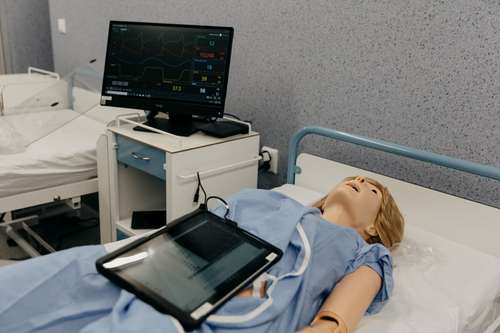In today's fast-paced world, sleep has become a luxury rather than a necessity for many. When you toss and turn all night, not only does your sleep quality suffer, but your overall well-being might be at risk. Sleep apnea, a common sleep disorder, has been linked to an increased microbleed risk in the brain, which can lead to serious health complications. This connection might sound surprising at first, but as we dive deeper, you’ll see how our nightly sleep troubles affect much more than just energy levels for the day ahead.
Sometimes, it's easy to ignore the signs of a sleep disorder until it affects our day-to-day life. However, new research is shedding light on the association between obstructive sleep apnea and cerebral microbleeds, revealing how intermittent interruptions in breathing during sleep can adversely influence brain health. It goes to show that our sleep is interconnected with everything, from mental being to the prevention of stroke or dementia. Let’s explore this intriguing relationship further.
Understanding Sleep Apnea and Its Complications
To kick things off, it’s important to grasp what sleep apnea is all about. Sleep apnea is a sleep disorder characterized by repeated pauses in breathing caused by upper airway collapse during sleep. This condition often leads to snoring, disturbed sleep, and when left untreated, can cause a cascade of health problems. Many of us might be familiar with sleep apnea by its common symptoms, but its far-reaching impacts, like the increased microbleed risk, might not be as well-known.
The complications of obstructive sleep apnea extend beyond just feeling tired during the day. When your body doesn’t get enough oxygen at night, it struggles to perform essential functions, including repairing brain cells and maintaining overall brain health. This sleep disorder can lead to sleep apnea effects that increase the chance of microbleeds forming in the brain, potentially resulting in higher brain health risks in older populations.
Experiencing interrupted sleep multiple times ideally sets the stage for further complications. For instance, when the brain is deprived of the oxygen it needs during these episodes, tiny blood vessels might leak, leading to cerebral microbleeds that can weaken brain function over time. Although these microbleeds might seem like minor damage, they can accumulate and contribute to long-term risks such as stroke and dementia.
The Science Behind Microbleeds and Brain Health
Let’s dive into the science a bit deeper. Emerging studies have suggested that moderate to severe obstructive sleep apnea may be a contributing factor to the development of brain microbleeds. Researchers are beginning to uncover that the intermittent drops in blood oxygen causes subtle damage to the brain’s vascular system. It’s almost like a slowly dripping faucet that eventually wears away at the metal over time.
These tiny leaks in the brain, known as microbleeds, seem to appear more frequently among individuals struggling with sleep disorders. Brain microbleeds, though small in size, are significant because their presence has been linked to future strokes and even dementia. Many in the medical community are now urging for greater attention on sleep health, emphasizing that proper sleep apnea management might help mitigate these risks.
When you think about how our bodies depend on consistent, quality sleep to repair and regenerate, it becomes clear. Intermittent hypoxia—the technical term for low oxygen episodes during sleep—can trigger inflammation and damage the intricate network of blood vessels inside the brain. Over time, these changes might lead to an increase in microbleed causes and further complicate sleep apnea complications. It is this insight that propels researchers to investigate further how sleep apnea and brain health are intertwined.
One can’t help but wonder: could the way we manage sleep apnea today be key in preventing serious neurological events down the line? The relationship between sleep apnea complications and brain risk factors continues to evolve, urging both medical professionals and patients to take early signs seriously.
Sleep Apnea Management: What Can You Do?
Addressing sleep apnea may sound daunting, but the good news is that there are many effective strategies available. Sleep apnea management begins with understanding your condition – if you suspect that you suffer from sleep apnea, getting a proper diagnosis is the first step. Increased microbleed risk is just one of the many reasons to seek professional help if you have concerns about your sleep quality.
Effective treatment methods include lifestyle changes, such as adjusting sleeping positions, weight management, and using CPAP (continuous positive airway pressure) devices. These treatments not only improve sleep disorder symptoms but may also help reduce cerebral microbleeds, indirectly safeguarding brain health. Taking charge of your sleep environment can be as important as managing your diet or exercise routine.
In many ways, managing sleep apnea is like giving your brain a fighting chance to repair itself each night. By reducing the chances of oxygen deprivation, you might be reducing the microbleed causes that heighten brain health risks. It’s a reminder that investing time and energy into sleep well-being pays dividends in long-term health. Even small changes in sleep habits can make a significant difference over time!
As the research suggests, addressing the root cause—obstructive sleep apnea—can be a powerful preventive measure against strokes and dementia. Many patients report significant improvements in their overall sleep quality and energy levels when they adhere to treatment plans designed to manage sleep apnea effects. It’s important to remember, though, that sleep apnea management is not a one-size-fits-all solution, and working closely with your healthcare provider is crucial.
Implications for Brain Health and Future Research
We are only beginning to understand just how closely sleep apnea and brain health are linked. Recent studies highlighting increased microbleed risk in patients with sleep apnea provide compelling evidence that these sleep disturbances could have long-term impacts far beyond daytime fatigue. The potential damage caused by cerebral microbleeds serves as a wake-up call for those who take sleep for granted.
Researchers are increasingly focusing on how early diagnosis and proper management can help stave off severe complications such as strokes or dementia. The implications of these findings are far-reaching, suggesting that better sleep apnea management today might also protect against significant brain health risks later on. It's not just about improving sleep quality—it's about preserving brain function for years to come.
For anyone concerned about their brain health, paying attention to sleep disorder symptoms is an essential step. Whether you’re experiencing loud snoring, frequent awakenings, or simply not feeling rested in the morning, consider seeking professional help. Investing time to resolve sleep apnea complications today can lead to a healthier tomorrow, reducing the likelihood of developing more severe brain microbleeds and other neurological issues.
Advancements in medical technology and a better understanding of sleep disorders are giving us hope that future research will continue to unlock the mysteries behind sleep apnea and its effects on brain health. Until then, staying informed and proactive about your sleep habits remains a key factor in maintaining overall well-being.
In conclusion, the relationship between sleep apnea and increased microbleed risk is a potent reminder of how intricately linked our sleep is to brain health. Addressing sleep apnea early on and maintaining a healthy sleep routine can offer more than just a good night’s rest; it may also be a critical step in preventing strokes and dementia. As we continue to learn more about sleep disorders and their far-reaching consequences, every small step you take towards better sleep could be a giant leap for your long-term brain health and overall quality of life.




